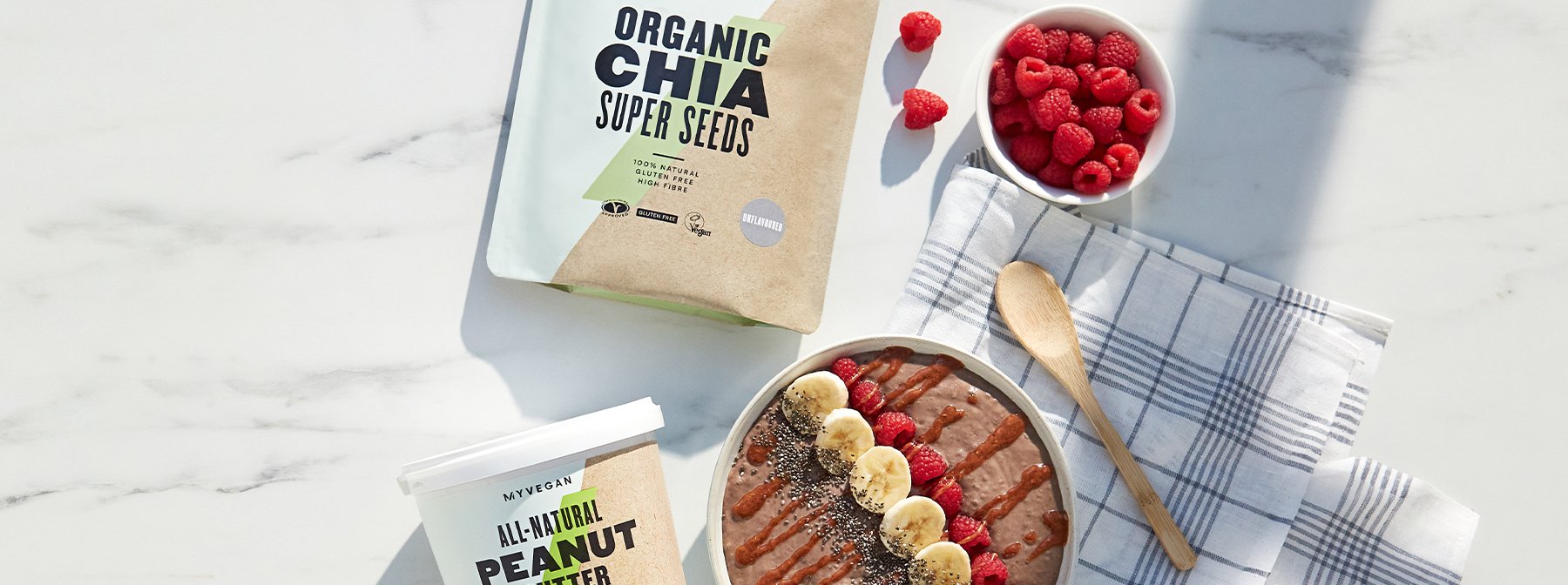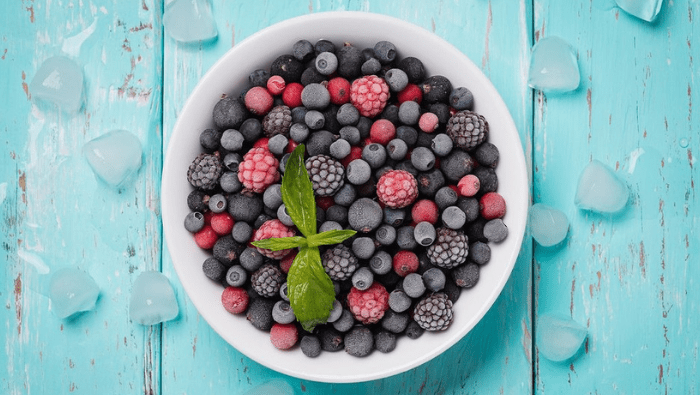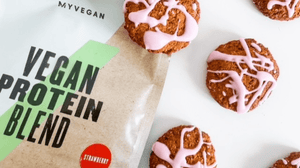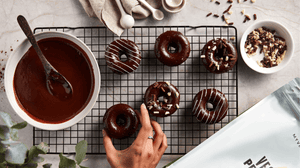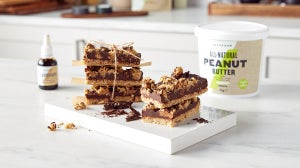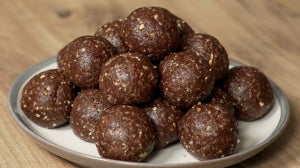
The inclusion of fat in the diet has started to gain popularity, as people have realised the importance of fats. Fats are essential in the diet as they are needed for the absorption of fat-soluble vitamins (A, E, D, K). Fats contain nutrients such as omega-fatty acids, which have a variety of benefits from skin nourishing to anti-inflammatory properties.
In the UK, recommendations used to exist that suggested the average adult male (19-64 years) consumes less than 97g of total fat per day, whilst adult females should have no more than 78g of total fat per day. However, recommendations have now changed and focus mostly on saturated fat. It is recommended that men eat less than 30g saturated fat per day. For women, the recommendations are lower, at less than 20g of saturated fat per day.
- What Are Healthy Fats?
- Which Foods Contain Healthy Fats?
- Chia Seeds
- Flaxseeds
- Coconut Oil
- Nuts
- Nut Butters
- Hemp Seeds
- Cacao
- Avocados
- Tahini
- Olive Oil
- FAQs
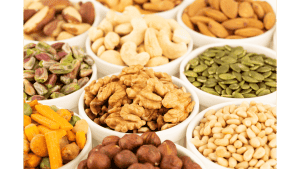
What Are Healthy Fats?
Some fats are considered to be better for you than others, so it’s important to understand the different types. Saturated fats are typically found in processed foods, dairy products and meat. Eating excess saturated fat can lead to a build-up of cholesterol in the body, which can clog blood vessels and increase the risk of heart disease.
Trans fats, like saturated fats, can also lead to high cholesterol if consumed in excess. Trans fats are mostly found in hydrogenated vegetable oil, which isn’t commonly used in the UK.
Unsaturated fats are the ‘healthy’ fats; unlike saturated and trans fats, unsaturated fats can help to lower cholesterol when used instead of saturated fats. Unsaturated fats can be divided into monounsaturated and polyunsaturated fats. Polyunsaturated fats typically contain omega fatty acids, which must be obtained through dietary sources.
Which Foods Contain Healthy Fats?
1. Chia Seeds
Chia seeds are the perfect addition to smoothies or oats; alternatively, these can be used as a plant-based egg substitute in baking, due to their water absorbing qualities. Chia seeds are a great source of fibre and the omega-3 fatty acids called alpha-linolenic acid (ALA)
One tablespoon (15g) of chia seeds contains 5-6g total fats (ranges vary), mostly polyunsaturated fats. Chia seeds contain more omega-3 than omega-6 fatty acids; this is important, as omega-3 can be harder to come by compared to omega-6.
2. Flaxseeds
Like chia seeds, flaxseeds are incredibly versatile. Both the seeds themselves and flaxseed powder can be used daily to help boost fibre content and are also commonly used in baking as an egg replacement. Flaxseeds are high in protein and two omega-3 fatty acids; alpha-linoleic acid and linoleic acid (LA).
One tablespoon (15g) of flaxseeds contains 11g of total fats; 73% of total fats are made up of polyunsaturated fats, including omega fatty acids.
3. Coconut Oil
Coconut oil is solid at room temperature due to its high saturated fat content. Coconut oil has been shown to raise both ’good’ cholesterol (HDL) and ‘bad’ cholesterol (LDL). Research looking at the health benefits of coconut oil have yielded mixed results.
15g of coconut oil (around a tablespoon), contains just under 13g saturated fat and 15g of total fat.
4. Nuts
Most nuts contain predominantly monounsaturated fats – the ‘heart healthy’ fats. However, the fat content depends on the type of nut, including the ratio of monounsaturated to polyunsaturated fats.
Nuts can also contain saturated fat, in varying proportions – highest in saturated fat include brazil nuts, macadamia nuts and cashew nuts. These nuts have more of a creamy flavour than almonds, peanuts or hazelnuts, which have lower amounts of saturated fats.
One portion of mixed nuts is 30g, equal to a small handful, and contains around 16g of total fat. Monounsaturated fats make up around half of the total fats (8g), with polyunsaturated fats making just over a quarter (4g) of total fats.
5. Nut Butters
Like raw nuts, nut butters contain varying quantities of fats and other nutrients. The trusty peanut butter, like the peanuts it’s made from, is high in unsaturated fats. Peanut butter also contains all of the essential amino acids, which act as a building block for protein. Peanuts have also been shown to contain phytosterols – a molecule that can help to block the absorption of dietary cholesterol.
One serving of peanut butter is usually considered to be two tablespoons (30g), which contains 15g of total fat. 11g of this consists of monounsaturated fats.
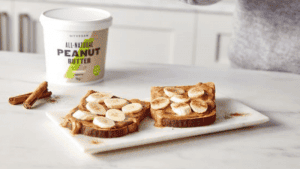
6. Hemp Seeds
Like chia and flax seeds, hemp seeds are high in unsaturated fats and protein. In fact, hemp is commonly used in plant-based protein powders and supplements. Hemp seeds dissolve easily, so can be added to smoothies and oats without affecting the taste. They can also be sprinkled over salads or used in baking as a protein boost.
Hemp seeds are high in polyunsaturated fats, with a greater amount of omega-3 fatty acids, compared to omega-6. Per 15g tablespoon, hemp seeds contain 15g of total fats and almost 10g of protein.
7. Cacao
The liquid from cacao beans can be used to make cacao butter, which contains both saturated and unsaturated fats. However, cacao powder, which is a by-product of roasting cacao beans, is high in monounsaturated fats. Cacao powder is high in antioxidant properties, which may help to fight inflammation within the body.
Two tablespoons (30g) of cacao powder contains 3.3g of total fat, 1.3g of which are unsaturated fats.
8. Avocados
Avocados are high in monounsaturated fats, which can be utilised to reduce LDL levels and increase HDL levels. Avocados are also a source of potassium, folate and fibre – all of which are important nutrients. Avocado oil is sometimes used as an alternative to cooking with coconut oil or olive oil.
Half a medium avocado is usually considered to be a portion size, which is roughly 100g. One portion of avocado contains just under 20g of total fat, over half of which is made up of monounsaturated fats (12g).
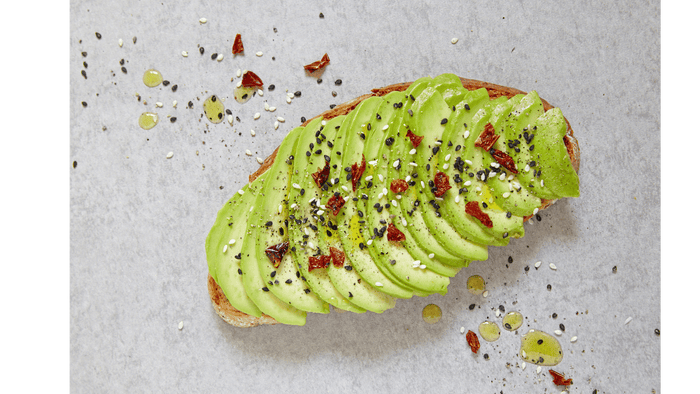
9. Tahini
Tahini is composed of predominantly unsaturated fats – 40% of which are monounsaturated, and 40% polyunsaturated. Tahini also contains antioxidant properties and is high in calcium, a nutrient especially important in vegan diets. Tahini is made from pressed sesame seeds and is an essential component of hummus.
A 15g tablespoon of tahini contains 8.8g of total fat; 3.3g of which consists of monosaturated fats, and 3.9g of polyunsaturated fats.
10. Olive Oil
Olive oil is a staple in the Mediterranean diet, which is cited as one of the best ways to eat to protect heart health. Typically, extra-virgin olive oil is used raw, in dressings and as a drizzle over food to enhance flavour. Regular olive oil can be heated to higher temperatures than extra-virgin olive oil, so is more commonly used for cooking. Olive oils are high in unsaturated fats, especially monounsaturated fats.
15g of olive oil (around a tablespoon), contains just approximately 11g of monounsaturated fat and 15g of total fat. It also contains 2g of saturated fat, as well as 1g of polyunsaturated fats (containing essential amino acids).

10 Foods That Reduce Bloating
Try these tips to help relieve bloating...
Talk To Your Nutritionist
This article is for educational purposes only and should not be used as a substitute for medical advice. If you have any concerns about your health or diet, please contact your GP or other relevant healthcare professional.
Take Home Message
In summary, fat is an essential component of a healthy diet; we should aim to increase intake of unsaturated fats, including monounsaturated and polyunsaturated fats. Saturated fats can be damaging to health, and it is recommended to have no more than 20-30g per day.
There is no one-size-fits-all when it comes to fat intake. However, it is important to include some fats within the diets, not only for their own nutritional benefits, but also for the absorption of fat soluble vitamins and minerals.
For more expert nutrition advice, plant-based recipes, and exclusive offers, join our mailing list.
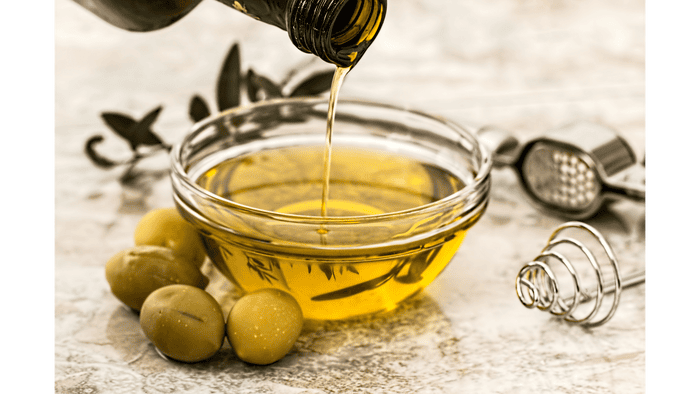
FAQs
What are plant-based fats?
Plant-based sources of fats are generally high in unsaturated fats, whilst being low in saturated fats. Examples of this include avocados, nuts and nut butters, seeds, and olive oil.
Is peanut butter a healthy fat?
Peanut butter contains predominantly unsaturated fats – the ‘good’ fats that can help to reduce cholesterol levels.
What fats should you eat daily?
Try to include fats that are predominantly unsaturated fats, including both monounsaturated and polyunsaturated.
What type of fat should you avoid?
Try to reduce consumption of saturated and trans fats, as these are high in the types of cholesterol associated with negative effects on health. However, some plant-based fats do contain small amounts of saturated fat, but this is generally balanced out by unsaturated fat content.
Public Health England. Government Dietary Recommendations [internet]. Public Health England. Aug 2016. Available from:
NHS. Fat: the facts [internet]. NHS. Apr 2020.
Kalja P, Sharma A, Sood D. Flaxseed – a potential functional food source. J Food Sci Technol. 2015; 52(4): 1857-1871
Harvard School of Public Health. Coconut oil [internet]. Harvard School of Public Health. Unknown date. Available from: https://www.hsph.harvard.edu/nutritionsource/food-features/coconut-oil/
Reister E, Belote L, Leidy H. The benefits of including humus and hummus ingredients into the American diet to promote diet quality and health: a comprehensive review [internet]. Nutrients. 2020; 12(2): 3679. Available from: https://doi.10.3390/nu12123678
https://www.ncbi.nlm.nih.gov/pmc/articles/PMC7760696/
Arya S, Salve A, Chauhan S. Peanuts as functional food: a review. J Food Sci Technol. 2016; 53(1): 31-41
Foods Standards Agency. McCance and Widdowson’s the composition of foods. 6th Ed. Cambridge: Royal Society of Chemistry.
Kulczynski B, Kobus-Cisowaska J, Taczanowski M, Kmiecik D, Gramza-MIchalowska A. The chemical composition and nutritional value of chia seeds – current state of knowledge [internet]. Nutrients. 2019; 11(6): 1242. Available from: https://doi.10.3390/nu11061242

